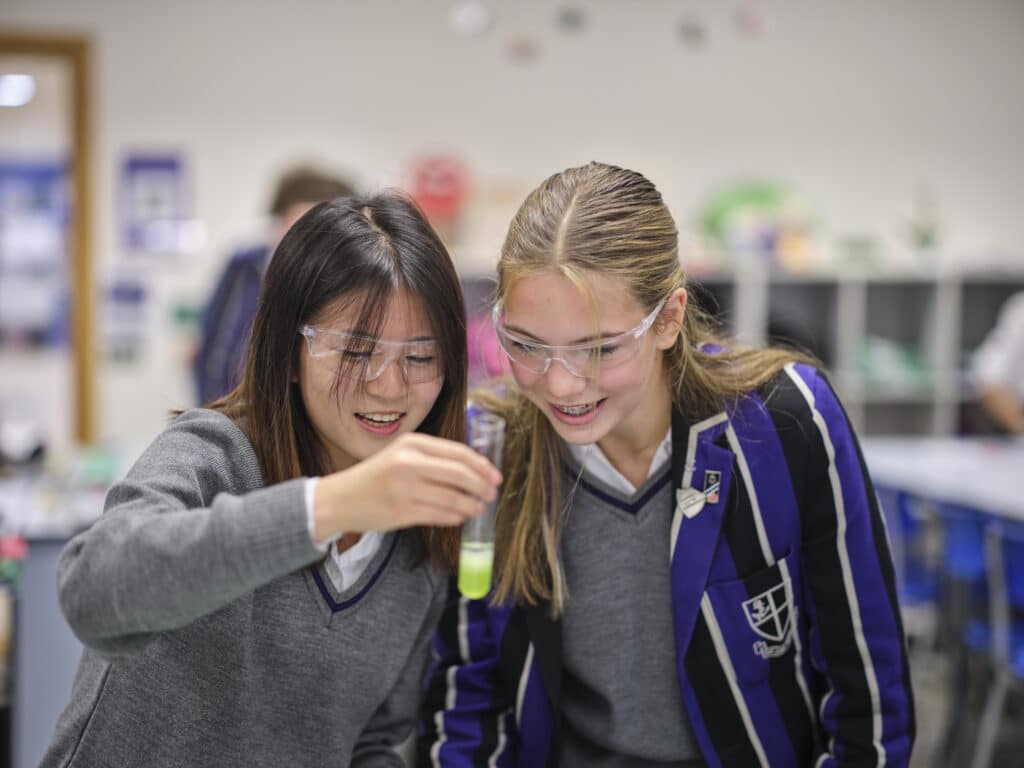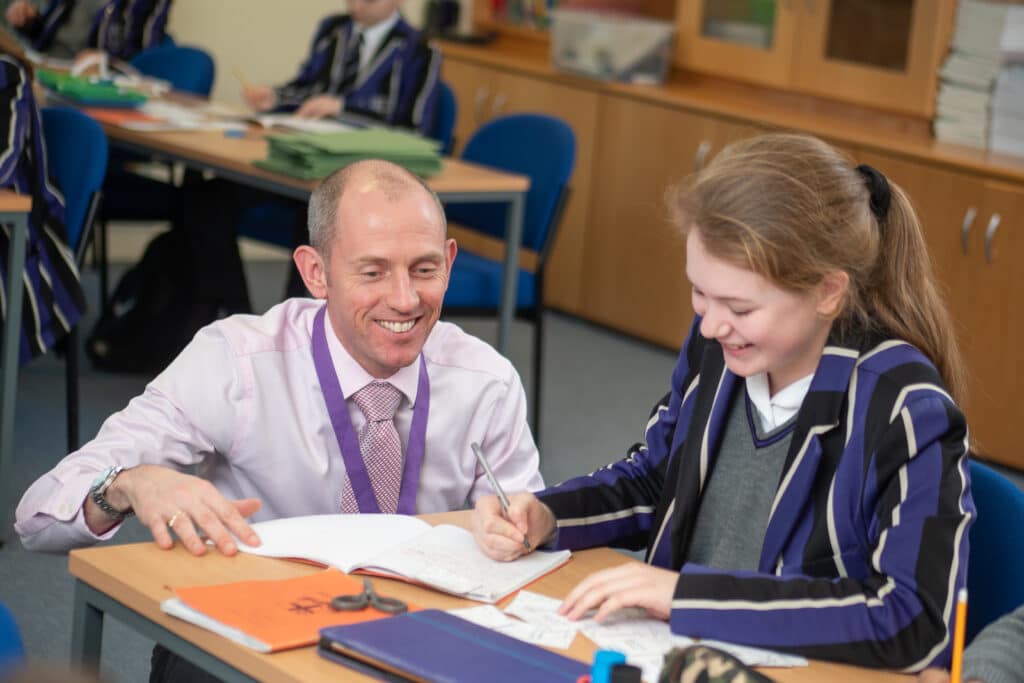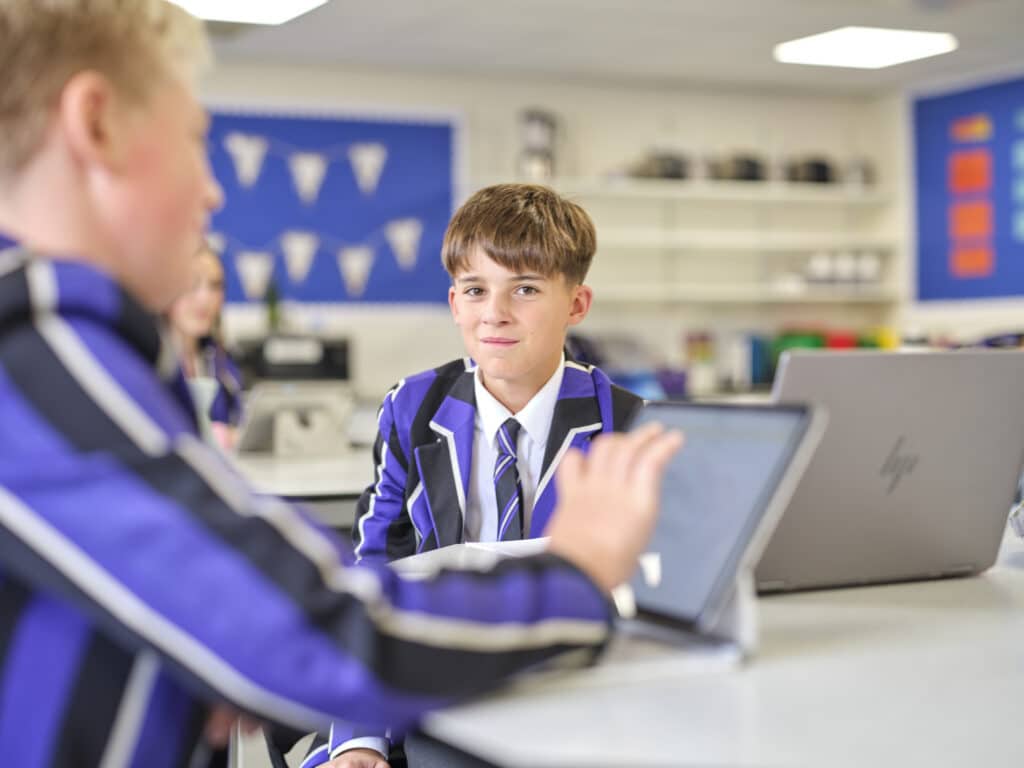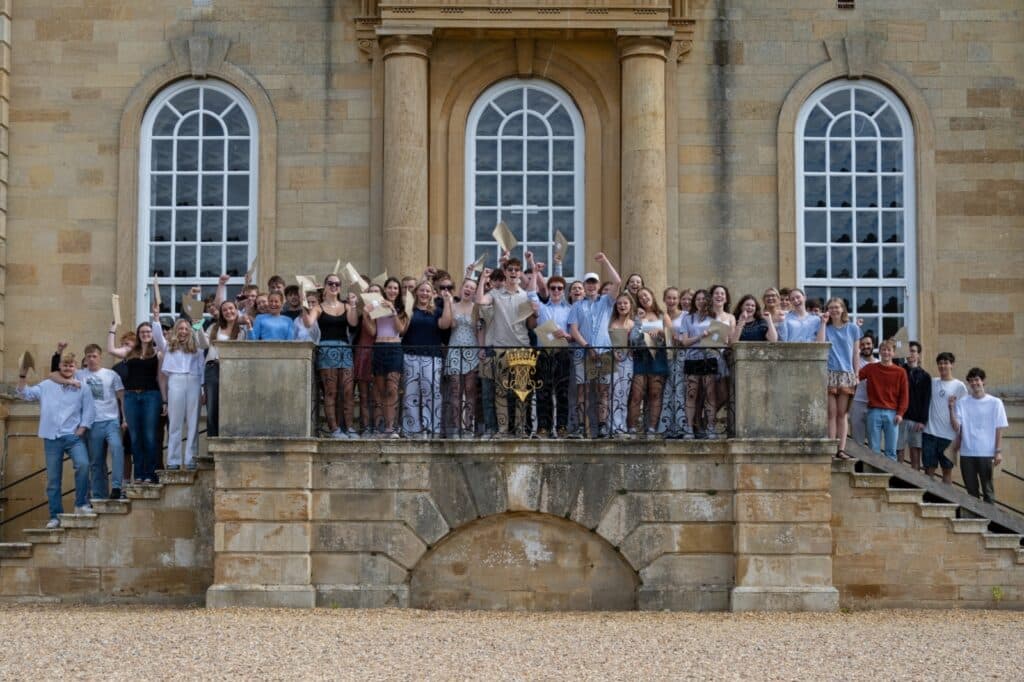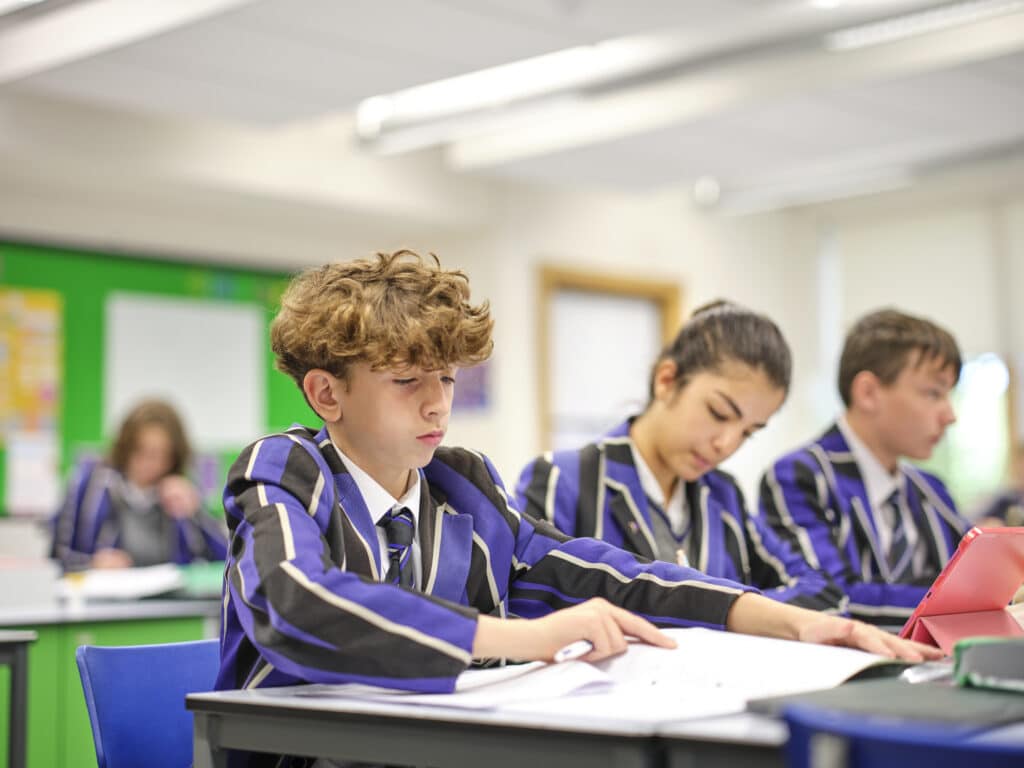
Academic – Senior
Stretch and challenge
A diverse and rigorous curriculum
With small class sizes, highly qualified teachers and an approach that fosters curiosity and independent thinking, we provide an environment where every pupil is challenged to reach their full academic potential.
Lessons cater for a wide ability range, including those with special talents or learning difficulties, with expert advice from our Academic Support team.
Stretch and challenge
We provide diverse opportunities for pupils to be academically challenged, ensuring they reach their true potential.

Individual tailoring
Departments offer a range of suggestions for students to extend learning, including resources accessed via our e-learning platforms such as websites, videos, TED talks and podcasts, alongside regular lunch time subject support. Through our Junior Scholars programme (First to Third Form) able pupils follow a thematic programme of study each year and complete an annual project.

Academic clubs and competitions
Clubs and societies, open to all include everything from our History Society, Digital Learning Club and Politics Society to CSI Kimbolton (Biology and forensics), Kimbookworms, Debating, Engineering Club, Law Society and Enlightenment Society.
Subject departments, clubs and societies embrace academic and cerebral competitions, both internal and to a national level. These include Mathematics Challenges, Science Olympiads, ‘Poetry by Heart’ recitation competition, Model United Nations, Young Enterprise, our Summer Art Competition, Mock law trials, the Great Britain Technology Challenge and the Peter Smout Memorial Essay Writing Competition.
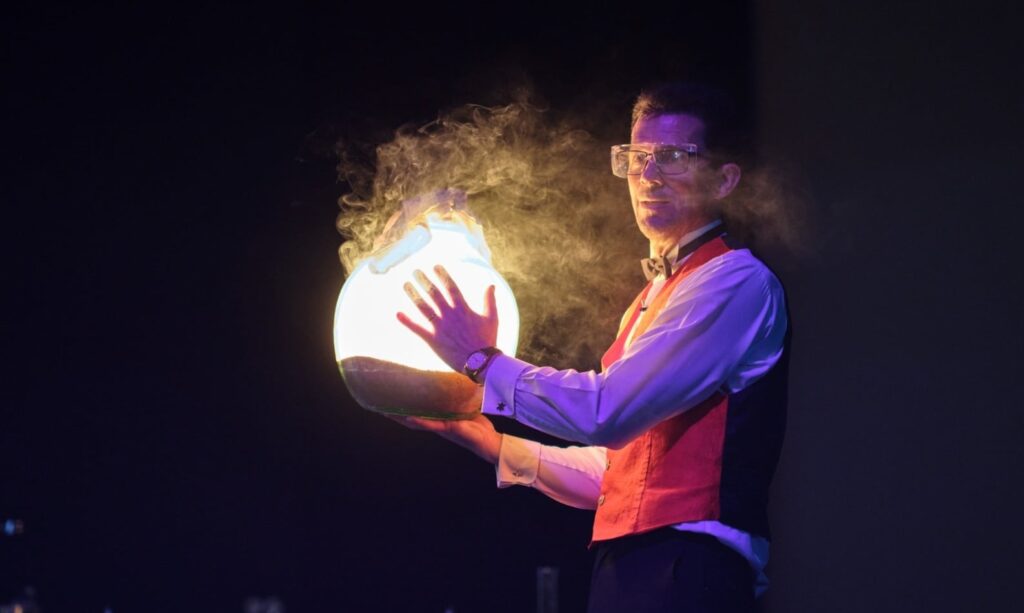
Lectures
We offer a range of lectures, often in evenings, given by subject specialists from the academic and professional worlds. Many are organised by our societies but they are open to all, including parents and sometimes local residents.
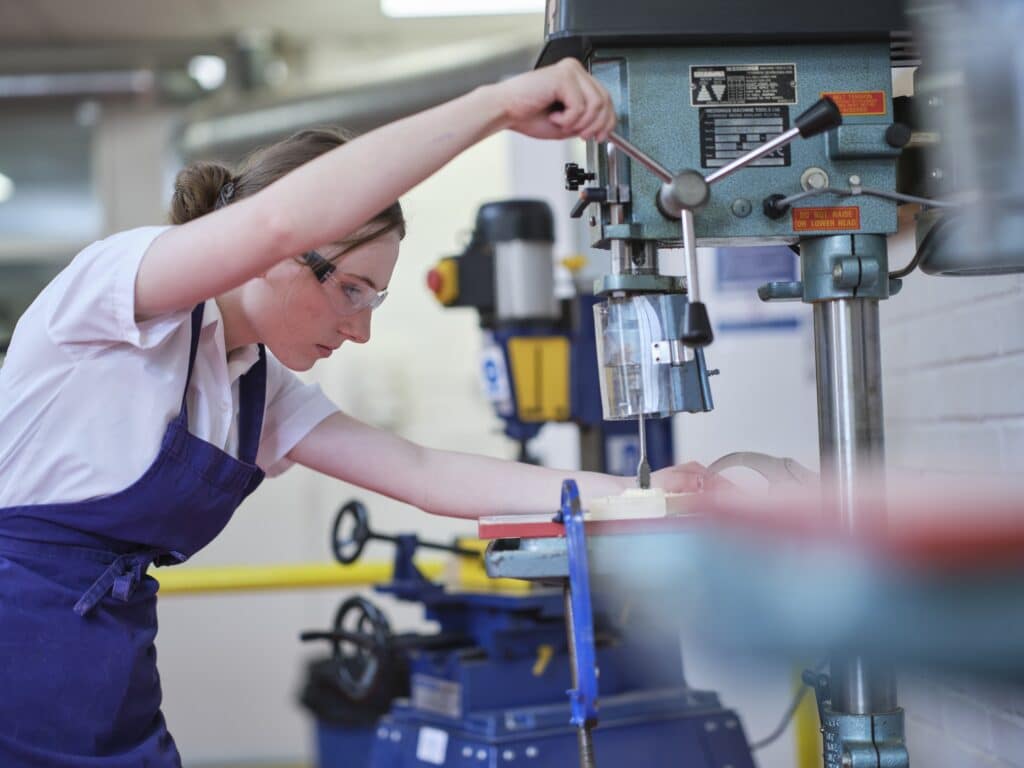
Projects
Projects develop research, analytical and critical thinking skills, preparing for the independent learning style expected at university:
- First to Third Form (Years 7 – 9) Scholars can undertake a Higher Project Qualification (HPQ) at GCSE level
- Sixth Form students can apply for our Extended Project Qualification (EPQ)

Educational visits and special events
Our educational and cultural visits enhance our curriculum and extend and support class-based work. For all pupils, and particularly the most academically able, these trips enrich understanding and inspire further research.
Annual Arts or STEM (Science, Technology, Engineering and Maths) Weeks bring visiting speakers and innovative learning experiences into school.
Our Model United Nations sessions unite pupils to develop their speaking and presentational skills, whilst gaining a deeper understanding of pressing international issues.
First to Third Form (Years 7-9) curriculum
In the first three years all pupils follow a core curriculum of:
| English | Biology | Physical Education (inc. Games) |
| Mathematics | Chemistry | Information and Communication Technology (ICT) |
| French | Physics | Food and Nutrition |
| Spanish | Art | Design Technology |
| History | Drama | Engineering |
| Geography | Music | Personal, Social and Health Education |
| Philosophy, Religion & Ethics |
In the Third Form (Year 9) pupils choose to study two out of the three creative subjects: Art, Design Technology and Food Technology.
First to Third Form by subject
Art
Art at Kimbolton is for everyone. Every pupil has opportunities to be creative in painting, printmaking and sculpture. Large rooms and small classes enable us to be ambitious with scale, media and materials. Our beautiful grounds, trips to galleries and residential visits to Burwell House take art out of the classroom throughout the year.
In the First and Second Forms all pupils have art lessons once a week. In Third Form Art is a creative option and pupils choosing Art have two lessons a week in groups of about 16.
In the First and Second Forms, we cover a wide variety of ever-changing projects, based around formal elements such as colour, line, tone and proportion.
In the Third Form pupils work on individual, independent projects based on a chosen theme. You will try out lots of media and develop your skills further that you have learned so far. There will be opportunities to use paint, printing techniques and 3D and start to think about how your practical and creative skills might serve you in the future.
Design Technology and Engineering (DTE)
DTE at Kimbolton covers a wide range of skills and techniques, from the wood workshop and metal welding bay, to our CAD/CAM design studio and the latest technology.
Pupils learn in a safe, yet challenging environment, with an emphasis on producing work of the highest quality. Traditional craft skills are taught alongside new tools of design including rapid prototyping and laser technology.
In the First and Second Forms, groups of up to 12 pupils focus on workshop safety, training on machinery, structures, mechanism and use of three key materials (wood, metal and plastic) to make various projects.
Third Form pupils choosing Design Technology & Engineering undertake numerous projects, based on wood, metal, graphics, CAD and Engineering, all in preparation for GCSE level study.
Digital Learning and Computer Science
As well as incorporating technology across the curriculum, Digital Learning is a discrete subject in our First to Third Forms, leading to the optional Computer Science GCSE.
All First to Third Forms have one weekly Digital Learning lesson, introducing coding and programming. We encourage pupils to become ‘creators’ and not just ‘consumers’ of technology. They learn to write programs, create graphical art and to write scripts to control robots and rovers. This enables pupils to gain an understanding of how they can become the next generation of creators in this cutting-edge field.
Current projects include:
- Exploring Polygons, Guilloche, Hoehn patterns and Fractals
- A Deep Dive into the Mandelbrot Set
- Race Line Following Rovers Around the Room
- Python for Beginners to Advanced Level
- Creating Programs, Games and Apps
Drama and Theatre
Drama and Theatre embraces the world around us, exploring through practical means the way the world works and how we exist within it. It allows for endless amounts of creativity and imagination.
At Kimbolton, Drama is about discovery: discovering the ways in which theatre can be made, issues and themes explored and characters portrayed. Our pupils learn practically, developing skills in creating, performing and analysing theatre, teamwork, time management and organisation. We encourage theatre inside and outside the classroom and offers many opportunities for academic learning and extra-curricular development.
In the First to Third Forms, we teach Drama as a discrete subject; all pupils receive one lesson a week. We teach skills and techniques to create engaging, thought-provoking theatre and characters. Our objective is to encourage pupils to develop their voice and movement skills alongside developing effective rehearsal techniques.
We develop pupil’s acting and directing skills, whilst progressing their confidence, communication and ability to work as a team and lead. We do this through a range of Schemes of Work that encourage pupils to engage with the world around them: covering historical, political and social themes. In addition, we explore different genres and styles of theatre to broaden knowledge and understanding.
In the Third Form we progress to schemes directly linked to our Drama GCSE course. They prepare pupils for the rigours of GCSE study, and include an extended devised project. In addition, we develop more advanced skills of creating and working to a concept, time management, leading rehearsals and directing.
English
“If you only read the books that everyone else is reading, you can only think what everyone else is thinking.” Haruki Murakami
English at Kimbolton is exciting, challenging and mind-expanding. As a core subject, English provides a broad and adventurous curriculum, incorporating digital innovation and drama, while keeping Literature at the heart of the subject.
We also make time for full stops, spelling rules and grammar, because communicating well matters – whatever a student chooses to do when they leave school.
In the first three years of the Senior School, we introduce a wide range of poetry, modern drama, texts from other cultures and a Shakespeare play in each year. Creative writing, performance and independent projects ensure we access literature in different ways, whilst embedding key skills of analysis and literacy.
English as an Additional Language (EAL)
EAL is undertaken by a specialist in our English Department and supports and the ability to communicate effectively, in speech and writing, in a language which is not their mother tongue.
EAL enables pupils to undertake their studies in all subject areas successfully and helps with an appreciation and knowledge of British culture, manners and behaviour.
We are a flexible department, welcoming a wide range of different educational backgrounds and expectations in our pupils, alongside differences in ability levels, linguistic needs and the dynamics of class, small group and individual teaching.
EAL provision is available, in principle, to all pupils whose first language is not English.
Food and Nutrition
Food is a subject for life. We teach the underlying principles and skills to live a healthy life. We embrace current nutritional thinking and up-to-date practices. We utilise a lot of practical sessions and our pupils develop high-level culinary skills. We incorporate as many learning experiences as possible, delivered in a variety of styles including the frequent use of sensory testing.
In First and Second Forms, food is studied in small classes of about 12. Pupils gain an introduction to food, nutrition and healthy living, whilst developing practical skills using a variety of kitchen equipment, progressing to working independently. The Second Form course has a scientific basis, focusing on what happens to foods during the cooking process and the impact of nutrition.
In the Third Form pupils opting to continue with Food and Nutrition studies have two lessons a week, and explore different food commodities focusing on nutrition, as well as developing practical skills.
French
We emphasise the importance of a modern language in a global economy and promote the ‘Languages for Life’ message. We believe pupils should be equipped to meet the exciting challenges of the modern world by engaging in a foreign language.
We value all language skills, especially the speaking component, as well as a sound grammatical base. In teaching French, we also focus on its communicative and receptive importance. We use whole class tasks, pair-work, and autonomous learning and use modern technology in our teaching.
In the First Form, we consolidate the foundations laid in primary school, while fully accommodating pupils who have not been taught French before. We use topics that help pupils to expand their vocabulary rapidly, yet encounter grammatical features from an early stage. After one term we place pupils in sets (two upper and two lower).
In the Second and Third Forms, we develop linguistic skills, knowledge and understanding further, enables pupils to engage in discussions, and to write more extensively, using the past, present, and future tenses.
Geography
Geography sits comfortably between the sciences and humanities. It is the study of the physical and human environments and the inter-relationship between the two.
At Kimbolton, we embrace the traditional geography of places but enhance the curriculum with stimulating and thought-provoking field trips or activities for all year groups. We use specific countries and locations to give pupils real-life examples of the geographical issues faced by people.
In the First Form we provide a foundation in the subject, teaching topics that include maps, weather and settlements, along with geographical skills. In the Second and Third Forms pupils further develop their skills, knowledge and understanding by studying topics such as coasts, ecosystems, tourism, Japan, Brazil and Egypt.
History
Kimbolton School is steeped in History. As a medieval motte and bailey, the final home of Queen Katharine of Aragon, and the former seat of the Duke of Manchester, Kimbolton is a fine venue in which to embrace and experience History.
History generates satisfying enjoyment through persistent enquiry and our Department enables and supports all pupils, especially those who are curious about the past; seek to understand the present and future; and enjoy stories laced with triumph and tragedy.
First Form historians explore the complex, tangled social and political histories of Medieval and Tudor Britain. They assess and evaluate the impact of regime change under the Normans; comprehend the role of religion in everyday life and explore the challenges brought about by social movements and religious dispute. Additionally, we appreciate broader, global History via a study of the Islamic Golden Age and interactions with Western Christendom during the Middle Ages. This are complemented with local studies of Kimbolton, gaining a full appreciation of the history of the area.
During the Second Form, students grapple with the concepts of revolution, empire and social development in the Early Modern Britain. Enquiries into the impact of the trans-Atlantic slave trade on Africa, revolutions, and the impact of industrialisation in Britain provides students with an appreciation for Britain’s role within global history, as well as understanding where the modern state in which we live has originated.
The Third Form embark on an epic study of the turbulent 20th Century. Change and continuity in Britain; the fight for female suffrage; the collapse of peace in 1939; and snapshots of the Second World War. These topics facilitate enquiries into turning points, consequences, why historians disagree, and important moral questions pertaining to the age and beyond.
Mathematics
Our Mathematics Department is dedicated to helping pupils achieve. We offer a range of qualifications to suit pupils’ abilities so the least able receive a solid grounding in all aspects of Mathematics while, at the opposite end of the ability spectrum, gifted mathematicians are fully stretched.
We run a help desk most lunchtimes in the week and in the run up to examinations we are accessible and willing to help throughout the day.
In the First Form, we spend the first half of the first term concentrating on number work. There are several tests on subjects starting with BIDMAS and integer multiplication and progressing to indices, decimals, ratios and percentages.
Initially, new first formers are loosely set according to their entrance exam. After several mini tests, we re-set the first form after a comprehensive numeracy test at the end of Autumn term. Thereafter pupils study algebra and other areas of mathematics. For approximately ½ hour per week from December pupils hone their numeracy skills and attempt to pass their internal Bronze, Silver and Gold numeracy awards.
In the Second Form, we set from 1 to 6 but follow a common syllabus. We stretch every pupil and cover more advanced algebra, data handling and reinforce the First Form work. Tests have two sections; the first section is for all classes and the Extension section is aimed at the top sets.
For the Third Form, tests are split into three sections: Support, Core, and Extension. This allows a common section for the year group (Core) whilst also offering challenging questions for higher sets and appropriate questions for our smaller sets. Each class does two sections – either S and C or C and E.
The S section covers the building blocks of a topic and is based on material from the previous year. The Core section tests the main focus of the topic, building on the S section. The Extension Section is aimed at the ablest pupils. All tests use questions from past examination papers.
Music
Music occupies a central role in the life of all Kimboltonians. Almost half of our pupils learn an instrument or have singing lessons, and we offer countless opportunities to perform with a busy programme of lunchtime concerts, large public performances, concert visits, assemblies and tours abroad. Furthermore, House Music competitions see every pupil on stage at some point in the year.
The Music School is accommodated in the attractive Mews Quad. It boasts excellent teaching, rehearsal, ICT and recording facilities. We are fortunate to use the Castle State Rooms, a fine venue for weekly recitals and ABRSM exams; and Lewis Hall for staging major concerts and musical productions.
All pupils in the lower school have weekly class music lessons. They learn how music works through a rich and balanced diet of listening, composing and performing.
Philosophy, Religion & Ethics (PRE)
Through PRE, we help pupils understand that religion is, and always will be, a significant factor in the way the world develops. It influences our politics, our societies, our laws, and has left an indelible mark on history and human behaviour.
By studying contemporary ethical issues, alongside the history of philosophical thought and modern-day religious practices, we aim to help students understand the immense impact faith and ideas have on the world around them today.
In the First Form, we start by attempting to answer the question, what is God? By looking at a range of different ideas from the ancient Greeks to modern day religious art, we tackle one of the biggest philosophical questions of all. This unit of work is followed by in-depth studies of Judaism and Christianity, before moving on to investigate the ethical issues raised by war and conflict.
The Second Form starts with an investigation into whether it is rational to believe in God, drawing upon ideas from a range of philosophers and thinkers such as Freud, Aquinas, and Swinburne. Students then undertake a detailed study of Islam, followed by an inquiry into the ethics of modern-day consumerism.
In the Third Form, we begin by exploring Buddhism, a fascinating religion with a rich history and culture. This leads to a study into the philosophical concept of life after death, and a unit of work on medical ethics exploring topics such as cloning, euthanasia, and the ‘saviour sibling’ debate. The year ends with a philosophical enquiry into free will and determinism, asking the question: To what extent are my actions free?
Physical Education
Our Sports Department organises a wide range of curricular and co-curricular programme PE activities to cater for everyone, from the committed athlete to those participating for exercise and enjoyment.
Our ethos is to ensure quality, quantity and breadth of sporting opportunities so that all our pupils acquire the skills and knowledge to live a healthy lifestyle.
Unlike Games, we teach PE in form groupings with boys and girls learning and working together. We have a modern Sports Centre containing a large multi-purpose sports hall, a gymnasium, a fitness room, two squash courts, indoor and outdoor changing facilities and a designated PE classroom used for teaching A Level Physical Education.
We also have a 25m swimming pool, three astroturf pitches (two full pitches and one training pitch; one match pitch is fully floodlit), extensive playing fields, six outdoor cricket nets and two hard court netball and tennis areas.
The First to Third Forms have one PE lesson each week. Our curriculum offers a wide range of activities including swimming, tennis, badminton, basketball, gymnastics, health related fitness, orienteering, athletics, dance, and striking and field games.
Our aim is to provide a PE programme that facilitates all our pupils to acquire the skill and enthusiasm for long-term involvement in sport that will stay with them throughout their Kimbolton career and beyond.
The Fourth Form have one PE lesson per fortnight. At this stage students are encouraged to enhance their skills and develop areas of interest. Our broad curriculum continues, as does our encouragement of all pupils to involve themselves in sport.
Science
At Kimbolton our core science programme is enhanced by a range of extra-curricular activities and trips, designed to inspire pupils and develop their scientific skills as they progress through the school.
Biology, Chemistry and Physics are taught separately, by subject specialists, throughout the Senior School and we benefit from new, state-of-the-art facilities in the Queen Katharine Building.
- Biology – Biology at Kimbolton is taught by enthusiastic subject specialists. We emphasise the need for good practical and teamwork skills and our A level students regularly go on to Oxbridge and/or Medical School. Our First and Second Forms follow an enhanced Key Stage 3 Programme of Study, with an emphasis on practical work. We begin the AQA GCSE Biology course during the Third Form.
- Chemistry
At Kimbolton, we have a philosophy of employing practical work as the basis of all our teaching. Pupils get to try as many experiments as possible, complemented by demonstrations of our own. We broadly follow the national curriculum up to KS3 but extend and diverge from it as we see fit. In the First and Second Forms, pupils study our own bespoke schemes of work which have a highly practical bent. Topics studied include states of matter, chemical and physical changes, chemistry of the atmosphere, acids, alkalis and neutralisation as well as a number of others. In the Third Form we start the AQA GCSE Chemistry course. Pupils choose whether to continue to study this course or opt for the AQA Combined Science Trilogy during this year. - Physics – Physicists aim to understand the origins and workings of the Universe by formulating physical laws that describe everyday observations. At Kimbolton, we adopt a traditional approach to the subject based on thought-provoking practical work with the emphasis on academic rigour.
In the First and Second Forms we provide an introduction to the main areas of Physics with no topic lasting more than six weeks. In the Third Form we commence GCSE Physics work with some of the easier topics being covered. Practical work becomes more demanding.
PSHE
Science
At Kimbolton our core science programme is enhanced by a range of extra-curricular activities and trips, designed to inspire pupils and develop their scientific skills as they progress through the school.
Biology, Chemistry and Physics are taught separately, by subject specialists, throughout the Senior School and we benefit from new, state-of-the-art facilities in the Queen Katharine Building.
- Biology – Biology at Kimbolton is taught by enthusiastic subject specialists. We emphasise the need for good practical and teamwork skills and our A level students regularly go on to Oxbridge and/or Medical School. Our First and Second Forms follow an enhanced Key Stage 3 Programme of Study, with an emphasis on practical work. We begin the AQA GCSE Biology course during the Third Form.
- Chemistry
At Kimbolton, we have a philosophy of employing practical work as the basis of all our teaching. Pupils get to try as many experiments as possible, complemented by demonstrations of our own. We broadly follow the national curriculum up to KS3 but extend and diverge from it as we see fit. In the First and Second Forms, pupils study our own bespoke schemes of work which have a highly practical bent. Topics studied include states of matter, chemical and physical changes, chemistry of the atmosphere, acids, alkalis and neutralisation as well as a number of others. In the Third Form we start the AQA GCSE Chemistry course. Pupils choose whether to continue to study this course or opt for the AQA Combined Science Trilogy during this year. - Physics – Physicists aim to understand the origins and workings of the Universe by formulating physical laws that describe everyday observations. At Kimbolton, we adopt a traditional approach to the subject based on thought-provoking practical work with the emphasis on academic rigour.
In the First and Second Forms we provide an introduction to the main areas of Physics with no topic lasting more than six weeks. In the Third Form we commence GCSE Physics work with some of the easier topics being covered. Practical work becomes more demanding.
Spanish
Spanish is the world’s second most-widely spoken language in the world, after Mandarin Chinese. Over 572 million people in 21 countries across five continents speak Spanish either as first or second language. 477 million people are native speakers. This diversity, both in human and geographical terms, offers students of Spanish a wealth of opportunities. In fact, the British Council ranks Spanish first in the list of “languages which will be of crucial importance for the UK’s prosperity, security and influence in the world” (Languages for the Future, 2017).
Spanish combines well with virtually all other subjects. Today there is a global market for jobs. Knowing how to interact with people from other countries and cultures is a highly valued life skill. Pupils learning Spanish not only learn to communicate with other people by using the spoken language, but will also learn about Spanish and Latin American culture, developing their own cultural awareness and adaptability.
Spanish at Kimbolton School aims to combine the intellectual with the practical. We enable pupils to develop language skills needed for confident communication and provide varied opportunities to explore the history, culture, evolution, current social trends and traditions of Hispanic societies.
Above all, we aim to create a dynamic and enthusiastic atmosphere, getting involved in debates, challenges and a variety of interactive classroom activities, enjoying the possibilities this beautiful language offers to us as much as we do. ¿A qué esperas a unirte a nosotros?
Students start to learn Spanish at the beginning of the First Form and they are introduced to Hispanic culture. Our three-year course uses Viva 1, 2 and 3 (2nd Edition) and covers progressively the main elements of the language, giving pupils a firm grasp of essential grammar and encouraging them to use the language communicatively in the classroom and beyond. We encourage accurate pronunciation through the teaching of high frequency words and regular speaking practice.
As a Department, we value the freedom to expose students to different authentic material from a variety of sources. As a continuation from the Schemes of Work in First and Second Form, in the Third Form we explore more specific aspects of the Hispanic world at a basic level: art, literature and geography. Our aim is that pupils have an understanding of cultural manifestations in the target language that develops their curiosity.
“We nurture capable young people, who are interested in the world around them and confident in expressing their ideas and personalities. Our pupils leave us with an excellent blend of academic qualifications and extra-curricular experiences, tailor-made for applications to top universities and the world of work beyond the Castle Gatehouse.”
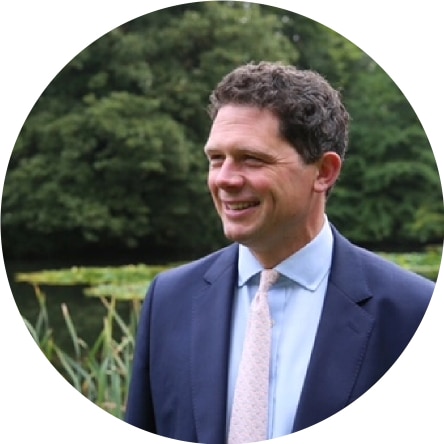
Will Chuter
Headmaster
-
“Kimbolton succeeds in combining academic rigour with rich co-curricular opportunities, giving pupils the confidence to thrive in senior school and beyond.”
WhichSchoolAdvisor
